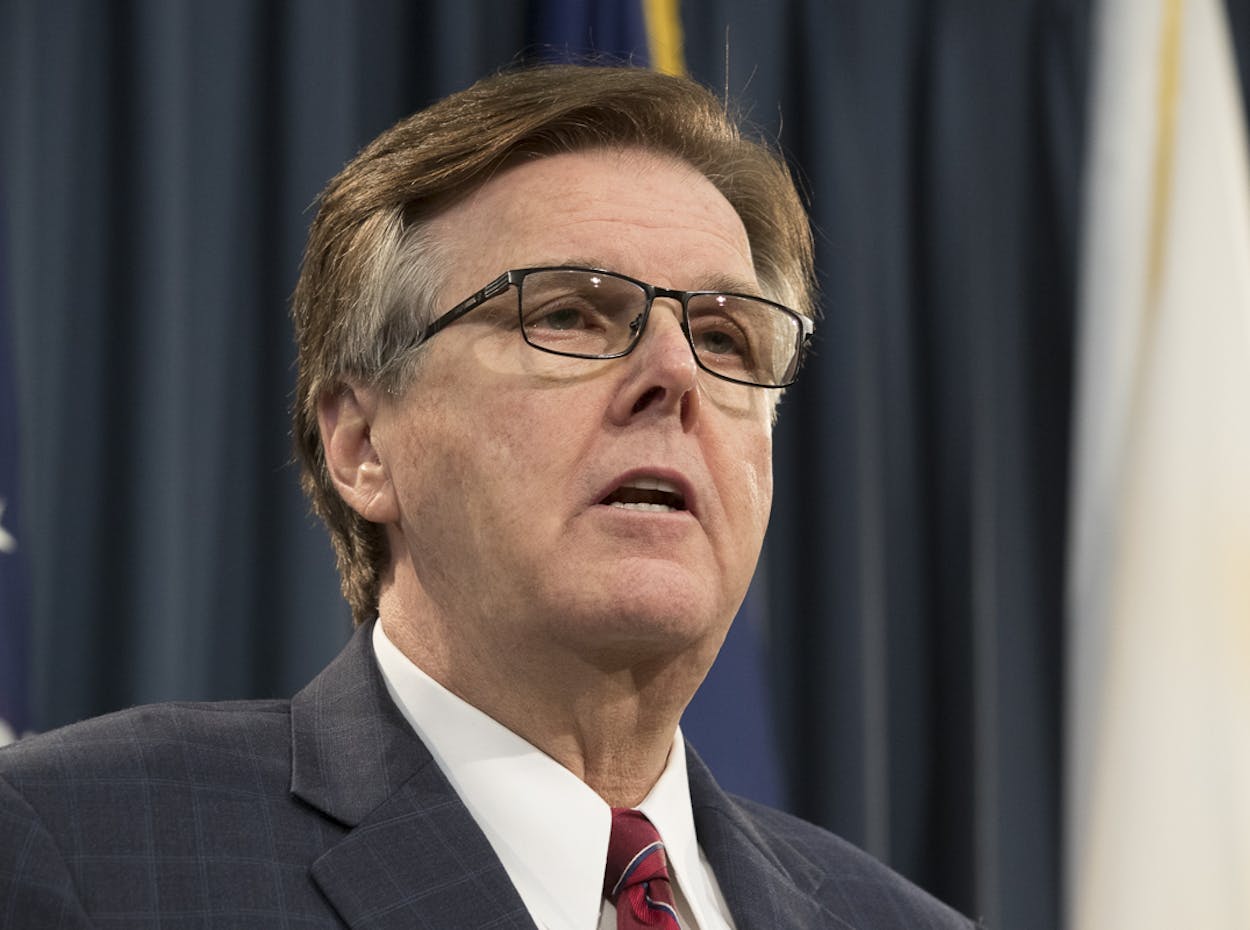It was a good day for Lieutenant Governor Dan Patrick. A media report over the weekend had seemingly undermined one of the main arguments against his transgender bathroom bill, and Patrick wasn’t going to let it pass without some gloating.
He convened a press conference on Monday to highlight the PolitiFact Texas report that labeled as “mostly false” a study by the Texas Association of Business that found the bathroom bill could cost Texas as much as $8.5 billion economic activity and up to 185,000 in potential job losses. “I hope all the media sources who printed that bogus TAB report will at least do a story now that TAB report has been shown not to be valid,” Patrick said.
The TAB in a news release stood behind its study, saying the economic impact predicted a range of $964 million to $8.5 billion in lost activity if the transgender bathroom bill passes. “We don’t need studies alone to prove the negative impact of this unnecessary legislation. The hard data exists in real time and in dramatically quantifiable ways when you look at North Carolina and Indiana today.” The association said North Carolina learned over the weekend that it will lose $250 million in National Collegiate Athletic Association events if the state’s restrictions on transgender people are not repealed. “This represents the tip of the iceberg for Texas, and we must avoid this collision course by rejecting discriminatory legislation.”
Patrick said that similar arguments were made Houston voters rejected the Houston Equal Rights Ordinance by an overwhelming margin in 2015. “Fear mongering is what that report is about,” Patrick said. “I don’t know of any business that hasn’t moved to Houston because of the issue. … We’ve had basketball tournaments. We had the greatest Super Bowl ever.”
PolitiFact wrote:
Portions of the study commissioned by the Texas Association of Business proved solid. But other elements were shaky. One projection, for instance, rests in the Super Bowl set for Houston on Feb. 5, 2017, being moved to another state. Another extrapolates Texas losses from research rooted in Arizona’s immigration law–not that state’s failed proposal targeting LGBT residents. And the report’s biggest projected loss to Texas starts from an Indiana legislator’s comment that might lack documentary backup…
Zehner wrote that four St. Edward’s business graduate students under faculty supervision reached the projections in December 2015—or more than a year before the 2017 legislative session. That timeframe explains why North Carolina’s experience wasn’t considered; its law won legislative approval in March 2016.
Such a law might cause economic shivers. But we find this study’s headlined figures, reached about 13 months ago, to be based on predicted or actual effects of discriminatory mandates in Arizona, Louisiana and Indiana that didn’t make it into law or were rescinded or softened. Moreover, not all the study’s numbers, calculations and assumptions proved solid and a key figure, reflecting on Indiana losing $1.5 billion in conventions, doesn’t appear to have a documented basis.
We rate this claim Mostly False.
The TAB study was widely reported by the state’s news media, including by Texas Monthly. The TAB is the umbrella organization for the state’s Chambers of Commerce and has been a reliable source of information in the past.
“I hope all of you who took that report on face value as issued by the Texas Association of Business…I hope you will report that it has been totally discredited,” Patrick said.
The legislation’s Senate sponsor, Republican Lois Kolkhorst of Brenham, said she has polling showing that support for the bill is growing, particularly among Republican women.
“I’ve had many conversations with women who are starting to realize this is truly about keeping men out of women’s locker rooms, out of the restrooms and out of the showers, especially those we find in our public school arena,” Kolkhorst said. “Just last week here in Austin we saw a 30-year old was arrested after taking lewd photos of a young girl after he had entered one of the restrooms.”
However, Kolkhorst’s example does not apply to the bill because the man accused of taking a photo of an underage girl did it in a grocery store restroom. The legislation does not cover restrooms of private businesses, even when they offer facilities to the public. Patrick last Spring joined a boycott of Target over a policy of non-discrimination against transgender individuals. Target store since then announced it will spend $20 million to install gender neutral bathrooms in its stores.
The bathroom bill as it currently exists would require public schools and government buildings to limit bathroom, changing facilities, and showers to use by people of their gender at birth. The bill also would overturn any local nondiscrimination ordinances that prevent private businesses from barring transgender people from using the restroom of the gender with which they identify. Patrick said the bathroom bill did not regulate private company bathrooms because “we’re free enterprise Republicans and we want the customers to voice their opinion.”






